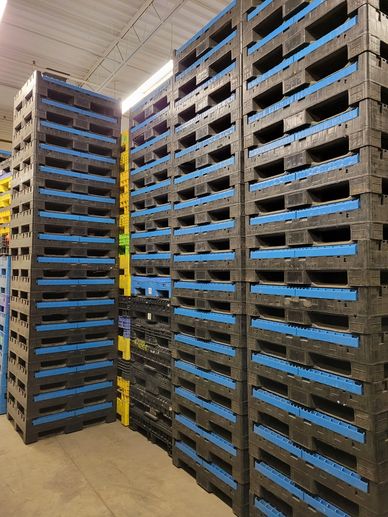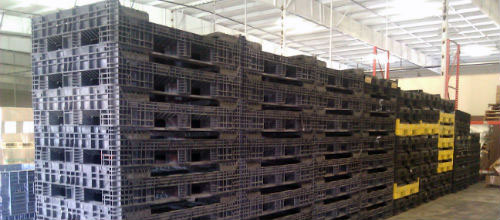The Ultimate Guide to Selecting the Right Mass Containers for Your Organization Needs
Choosing the proper bulk containers is vital for any type of company that relies upon reliable logistics. Various kinds of containers exist, each designed for specific materials and applications. Factors such as size, material compatibility, and governing requirements play a substantial function in this decision-making process. Recognizing these components can cause enhanced operational performance. Nevertheless, numerous services ignore vital elements that could improve their overall effectiveness and sustainability. What are these factors to consider?
Recognizing Different Kinds of Mass Containers
Bulk containers function as essential devices for organizations seeking reliable storage and transportation solutions. These containers are available in numerous types, each created to satisfy details functional needs. One typical type is the intermediate mass container (IBC), which is optimal for granulated and liquid materials, offering an equilibrium of capacity and maneuverability. One more preferred alternative is the bulk bag, or FIBC, ideal for completely dry, flowable items. These versatile containers are lightweight and can be easily transported and saved. For larger materials, rigid mass containers are usually utilized, giving longevity and security for risk-free handling. Furthermore, there are specific containers customized for dangerous products, ensuring conformity with security regulations. Understanding the unique qualities of these mass container kinds enables organizations to make informed decisions that optimize logistics and reduce costs. By selecting the right container, firms can enhance their functional efficiency and enhance their supply chain procedures.
Trick Material Considerations for Mass Containers
When selecting bulk containers, it is vital to consider the products utilized in their building. Variables such as chemical, durability, and stamina compatibility play a crucial duty in making certain the containers satisfy details operational demands. Additionally, weight and portability problems can affect both performance and transport logistics.
Product Sturdiness and Stamina
Resilience and strength are crucial aspects in picking materials for mass containers, as they directly affect the container's ability to stand up to different ecological conditions and taking care of procedures. Materials such as high-density polyethylene (HDPE), polypropylene, and stainless-steel are generally preferred for their robust buildings, providing resistance to temperature, influence, and abrasion variations. The choice of product also impacts the overall life-span of the container; stronger materials typically lead to much less constant substitutes, causing cost financial savings in time. In addition, the weight of the material can affect delivery prices and convenience of handling. Services need to consider their particular operational atmospheres and the potential for deterioration to guarantee peak durability and stamina in their bulk container selection.
Chemical Compatibility Variables
Recognizing chemical compatibility is important for picking mass containers, as the materials used have to withstand the certain materials they will hold. Numerous aspects affect compatibility, consisting of the chemical nature of the contents, temperature level, and period of storage space. For example, harsh chemicals might require containers made from stainless steel or specialized plastics that stand up to destruction. Furthermore, responsive substances can create heat or gases, requiring vented or pressure-rated containers. The selection of container material, whether polycarbonate, metal, or polyethylene, must straighten with the chemical buildings of the saved compounds to prevent breaches or leakages. Ultimately, a thorough examination of these compatibility factors assures secure handling and storage space, securing both workers and the atmosphere while maintaining item honesty.
Weight and Portability Problems
Picking mass containers includes not just evaluating chemical compatibility however likewise thinking about weight and transportability. Services have to analyze the ease of handling and transportation to optimize performance. Lightweight products like high-density polyethylene (HDPE) or light weight aluminum can facilitate easier motion and minimize delivery expenses. Alternatively, heavier containers may provide improved durability however can hinder wheelchair, particularly in environments calling for constant moving. Furthermore, the design of the container should enable hassle-free lifting and piling, ensuring ergonomic safety for workers. Companies must likewise take into consideration the facilities available for transport; as an example, containers compatible with forklifts or pallet jacks can improve procedures. Ultimately, the right equilibrium in between weight and mobility directly influences operational efficiency and price effectiveness.
Sizing Your Bulk Containers for Ideal Efficiency
When sizing bulk containers, services must meticulously analyze the measurements called for to suit their details products. In addition, weight ability is a critical element that influences efficiency and safety and security during transportation and storage. Effective sizing not only maximizes space but additionally optimizes operational process.
Determining Container Capacities
Selecting the ideal measurements for mass containers is vital for maximizing efficiency in storage space and transportation. Services have to examine their specific demands, considering aspects such as offered room, the nature of the products being stored, and the techniques of transportation made use of. Exact dimensions guarantee that containers fit ideally in automobiles and stockrooms, reducing lost space and decreasing dealing website with time. Standard dimensions can supply convenience, yet personalized dimensions may be necessary for unique requirements or to suit specific products. Furthermore, it is important to assess piling capabilities and access, as these factors influence general functional performance. Eventually, the best dimensions result in enhanced company and streamlined logistics, benefiting the overall performance of the organization.
Weight Capability Considerations
Comprehending weight capability is vital for services aiming to optimize their mass container effectiveness. The weight ability of a container directly influences storage abilities, transportation logistics, and general operational costs. Picking containers with the appropriate weight limits guarantees that services can safely save and deliver their goods without taking the chance of damages or compliance concerns. Overloading containers can result in structural failures, while underutilizing capability outcomes in squandered resources. When selecting containers, it is vital for organizations to evaluate their product weights and take into consideration any kind of regulative requirements. In addition, aspects such as the kind of product, intended use, and environmental conditions need to also influence weight capability decisions. By reviewing these components, services can improve effectiveness and guarantee a structured supply chain.
Regulatory Conformity and Safety And Security Standards

Regulative compliance and safety criteria play a vital function in the selection of bulk containers for businesses. Organizations has to guarantee that their containers satisfy different regulations established by local, national, and worldwide authorities. These standards usually pertain to product safety, structural stability, and correct labeling, which assist prevent accidents and assure the secure transport of goods.
Additionally, adherence to industry-specific standards, such as those from the Food and Medicine Administration (FDA) or the Occupational Security and Health And Wellness Management (OSHA), is critical for business dealing with unsafe materials or food products. Non-compliance can result in fines, legal concerns, or damage to a service's credibility.
Businesses must likewise consider the container's compatibility with the products being kept or carried to prevent contamination or chemical responses (used bulk containers). To sum up, recognizing and executing regulative conformity and security criteria is necessary for the liable and efficient use of mass containers
Sustainability Choices for Eco-Friendly Bulk Containers

Business are also discovering choices made from recycled materials, which not just save sources yet additionally sustain the reusing market. Advancements in design enable for lighter containers that call for much less power to transportation, further boosting sustainability. By incorporating these green mass container options, services can demonstrate their dedication to environmental stewardship while fulfilling consumer demand for sustainable techniques. This shift not just helps the planet but can additionally improve brand reputation and customer loyalty.
Cost-Effectiveness and Budgeting for Mass Containers
While several services concentrate on sustainability, cost-effectiveness stays an important aspect when selecting mass containers. Organizations must evaluate the first acquisition price, as well as long-lasting operational costs, to guarantee monetary practicality. Elements such as maintenance, longevity, and reusability play a considerable function in identifying general expenses.
Investing in high-quality containers might yield higher ahead of time expenses however can result in savings with lowered substitute prices and decreased waste. Furthermore, services need to consider transport expenses and storage space efficiency, as these can influence the general budget plan.

Regularly Asked Concerns
How Do I Determine the Right Container for Hazardous Materials?
To determine the ideal container for hazardous materials, one must examine compatibility with the substance, consider the container's material, check for regulative conformity, and evaluate capacity and safety features to guarantee correct handling and storage space.
Can Mass Containers Be Personalized for Certain Products?
Yes, bulk containers can be personalized for particular items. used collapsible bulk containers. Numerous features, such as layout, material, and dimension, can be customized to fulfill unique demands, ensuring excellent security and efficiency for transferring and storing various products
What Is the Ordinary Life Expectancy of Different Mass Container Types?
The average life-span of mass container kinds varies; plastic containers last 5-10 years, metal containers 10-20 years, and wooden containers usually last 3-7 years, relying on usage, upkeep, and environmental conditions.
Exactly how Should I Clean and Maintain Mass Containers?
To clean and preserve bulk containers, one ought to regularly evaluate for damage, eliminate residue, laundry with appropriate cleaning agents, rinse completely, and assurance appropriate drying out prior to storage. Complying with producer guidelines enhances durability and security during usage.
Exist Rental Alternatives for Mass Containers Available?
Yes, numerous companies use rental options for bulk containers, offering versatility for companies. These leasings can accommodate various requirements, enabling firms to handle supply efficiently without the dedication of buying containers outright.
Toughness and strength are critical aspects in selecting products for mass containers, as they directly influence the container's ability to stand up to different ecological problems and managing procedures. Understanding chemical compatibility is essential for selecting mass containers, as the products utilized must resist the certain compounds they will certainly hold. Recognizing weight capacity is crucial for services aiming to optimize their bulk container performance. Governing compliance and security standards play a necessary function in the option of bulk containers for organizations. While numerous companies concentrate on sustainability, cost-effectiveness stays a vital aspect when selecting bulk containers.